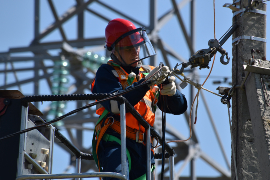Spotlights
Power Line Technician, Electrical Technician, Electric Utility Technician, Substation Technician, Energy Maintenance Technician, Power System Technician, Electrical Field Technician, Power Plant Technician, Renewable Energy Technician, High Voltage Technician, Transmission Technician, Distribution Technician, Electrical Lineman, Energy Inspection Technician, Energy Repair Technician, Electrical Installer and Repairer, Electrical Equipment Installer/ Repairer
Thế giới của chúng ta chạy bằng điện! Nhưng tất cả năng lượng điện đó đến từ đâu? Hiện tại, 60% năng lượng điện của chúng ta được tạo ra từ nhiên liệu hóa thạch, chủ yếu là than đá và khí đốt tự nhiên. Phần còn lại đến từ các phần bằng nhau năng lượng hạt nhân và năng lượng tái tạo như gió, thủy điện và mặt trời.
Kỹ thuật viên Phát điện/Phân phối Điện, Bảo trì, Kiểm tra và Sửa chữa (gọi tắt là Kỹ thuật viên Hệ thống Điện) là một thuật ngữ rộng để chỉ những người lao động đảm bảo hệ thống điện của chúng tôi hoạt động trơn tru.
Là Kỹ thuật viên Kiểm tra Điện trường, nhiệm vụ của họ có thể bao gồm bảo trì, kiểm tra và sửa chữa các thiết bị điện sản xuất điện (thường là tại các nhà máy điện, trạm biến áp, trạm biến mạch hoặc trang trại năng lượng mặt trời và gió).
Là người lắp đặt và sửa chữa đường dây điện, họ duy trì các đường dây điện truyền tải điện từ các điểm xuất phát của nó trên khắp đất nước đến tất cả người dùng cuối của chúng tôi, mọi lúc mọi nơi! Điều này liên quan đến việc quản lý cơ sở hạ tầng lưới điện và các máy biến áp, trạm biến áp và mạng lưới đường dây phân phối mà chúng ta thấy lơ lửng trong không khí trên các cột và tháp.
Là nhà phân phối và điều phối điện, họ chịu trách nhiệm kiểm soát và quản lý dòng điện từ nhà máy điện đến trạm biến áp và người tiêu dùng, đảm bảo cung cấp điện ổn định, liên tục.
Mặc dù những nỗ lực của Kỹ thuật viên Hệ thống Điện thường không được chú ý, nhưng kết quả công việc của họ giữ cho xã hội của chúng ta hoạt động cả ngày lẫn đêm!
- Trực tiếp đóng góp vào hiệu quả và độ tin cậy của sản xuất và phân phối năng lượng
- Đảm bảo an toàn công cộng và hoạt động trơn tru của vô số cơ sở và nhà cửa
- Ngăn ngừa sự cố và gián đoạn tốn kém thông qua công việc bảo trì và sửa chữa thường xuyên
Lịch làm việc
Kỹ thuật viên hệ thống điện (Kỹ thuật viên kiểm tra điện trường, thợ lắp đặt và sửa chữa đường dây điện, và nhà phân phối và điều phối điện) làm việc toàn thời gian với thời gian làm thêm giờ không thường xuyên để đáp ứng thời hạn dự án. Công việc liên quan đến việc đi du lịch đến các trang web, đôi khi bên ngoài khu vực địa phương. Họ có thể tiếp xúc với các điều kiện thời tiết khác nhau khi làm việc ngoài trời và phải luôn thực hành các biện pháp an toàn để tránh rủi ro và thương tích.
Nhiệm vụ tiêu biểu
Kỹ thuật viên hệ thống điện có thể làm việc với tư cách là Kỹ thuật viên kiểm tra điện trường, Người lắp đặt và sửa chữa đường dây điện, hoặc Nhà phân phối và điều phối điện. Đôi khi có sự chồng chéo - đặc biệt là khi nói đến kiến thức và kỹ năng cần thiết.
Các nhà phân phối và điều phối điện quản lý dòng điện từ các nguồn gốc của nó đến người dùng cuối. Người lắp đặt đường dây điện tập trung vào cơ sở hạ tầng vật lý của phân phối điện. Kỹ thuật viên kiểm tra điện trường có vai trò rộng hơn bao gồm đánh giá hiệu suất và độ an toàn của hệ thống và thiết bị điện.
Mức độ của bất kỳ sự chồng chéo nhiệm vụ nào phụ thuộc vào thiết lập công việc cụ thể và yêu cầu của người sử dụng lao động.
- Lắp đặt các thiết bị điện như máy phát điện, tuabin, nồi hơi, trao đổi nhiệt, hệ thống điều khiển, máy biến áp, thiết bị đóng cắt, máy bơm, giá trị, băng tải, máy cấp liệu, hệ thống kiểm soát khí thải, hệ thống làm mát, hệ thống bột và hệ thống năng lượng tái tạo
- Vận hành thiết bị và giám sát hoạt động bình thường
- Thực hiện bảo trì định kỳ để giữ cho thiết bị ở hiệu suất tối ưu và kéo dài vòng đời của hệ thống
- Sử dụng cảm biến chẩn đoán, đồng hồ đo và các dụng cụ khác để khắc phục sự cố và sửa chữa
- Tham khảo hướng dẫn vận hành, sơ đồ và sơ đồ để khắc phục sự cố
- Duy trì đường dây điện để đảm bảo cung cấp điện liên tục
- Tiến hành kiểm tra hệ thống kỹ lưỡng để tìm ra bất kỳ lỗi, hư hỏng hoặc mối nguy hiểm tiềm ẩn nào
- Kiểm tra và hiệu chỉnh thiết bị khi cần thiết
- Ứng phó với sự cố mất điện và các trường hợp khẩn cấp để có điện trở lại an toàn
- Lưu giữ hồ sơ của tất cả các công việc bảo trì, kiểm tra và sửa chữa
- Thực hiện theo các quy trình an toàn đã thiết lập để tránh rủi ro và thương tích; Mang thiết bị bảo vệ cá nhân phù hợp
- Phối hợp nỗ lực với các kỹ thuật viên, giám sát viên và quản lý đồng nghiệp
Trách nhiệm bổ sung
- Luôn cập nhật các quy định của ngành cũng như các công nghệ và quy trình mới
- Tham gia các cuộc họp an toàn, các buổi huấn luyện và phỏng vấn phi hành đoàn
Kỹ năng mềm
- Khả năng thích ứng
- Tư duy phân tích
- Chú ý đến chi tiết
- Giao tiếp rõ ràng
- Tư duy học hỏi không ngừng
- Tư duy phản biện
- Định hướng chi tiết
- Độc lập
- Giải quyết vấn đề
- Đảm bảo chất lượng
- Quan tâm đến an toàn
- Phán xét hợp lý
- Làm việc theo nhóm
- Visualization
Kỹ năng kỹ thuật
- Khả năng diễn giải và sử dụng bản thiết kế, bản vẽ kỹ thuật và sơ đồ
- Các nguyên tắc kỹ thuật điện và cơ khí cơ bản liên quan đến hệ thống điện
- Phân tích bằng cách sử dụng dữ liệu từ các công cụ và hệ thống chẩn đoán
- Quen thuộc với các quy định năng lượng, mã điện và tiêu chuẩn an toàn
- Thiết bị phát điện (máy phát điện, tuabin, v.v.)
- Toán đại cương để tính tải điện
- Hệ thống điện (tức là mạng lưới truyền tải và phân phối điện cao áp)
- Tổng hợp dữ liệu thành các báo cáo để bảo trì, sửa chữa hoặc cải tiến
- Thực hành an toàn liên quan đến thiết bị điện áp cao
- Công cụ hệ thống điện (máy kiểm tra điện áp, vạn năng, thiết bị chẩn đoán)
- Sức chịu đựng thể chất, phối hợp tay mắt và khả năng làm việc ở độ cao
- Các công ty sản xuất năng lượng
- Các công ty phân phối điện
- Cơ quan chính phủ
- Tổ chức nghiên cứu và phát triển
- Nhà cung cấp dịch vụ bảo trì, sửa chữa
Công việc của Kỹ thuật viên Hệ thống Điện tác động đến việc tạo và phân phối an toàn năng lượng điều hành cộng đồng của chúng ta. Họ phải thực hiện nhiệm vụ của mình với độ chính xác cao, đặc biệt là khi làm việc trên thiết bị điện áp cao! Công việc đòi hỏi sự chú ý đến chi tiết và tuân thủ các giao thức an toàn nghiêm ngặt.
Đôi khi môi trường làm việc có thể là một thách thức, đặc biệt là khi làm việc bên ngoài trong thời tiết khắc nghiệt, ở độ cao hoặc trong không gian hạn chế. Đó là lý do tại sao người lao động trong lĩnh vực này cần phải ở trong tình trạng thể chất tốt. Họ cũng phải sẵn sàng ứng phó trong thời gian ngắn khi mất điện.
Bởi vì công nghệ liên quan luôn thay đổi, các kỹ thuật viên phải cam kết một quá trình liên tục học hỏi những điều mới. Điều đó có thể có nghĩa là đầu tư thời gian cá nhân để loại bỏ các khóa đào tạo và chứng nhận.
Có một sự thay đổi lớn theo hướng tích hợp các nguồn năng lượng tái tạo như năng lượng mặt trời, gió, thủy điện và địa nhiệt vào lưới điện quốc gia, khi các cộng đồng thúc đẩy các giải pháp năng lượng bền vững, thân thiện với môi trường.
Tuy nhiên, việc tích hợp các nguồn năng lượng biến đổi này vào cơ sở hạ tầng lưới điện hiện có đòi hỏi phải thay đổi công nghệ quản lý lưới điện và lưu trữ năng lượng. Ví dụ, năng lượng mặt trời dựa vào ánh nắng mặt trời - không phải lúc nào cũng có sẵn (chẳng hạn như vào ban đêm hoặc khi trời nhiều mây). May mắn thay, sự phát triển trong công nghệ pin như pin lithium-ion và pin thể rắn đang làm cho việc lưu trữ năng lượng hiệu quả hơn và giá cả phải chăng.
Trong khi đó, công nghệ lưới điện thông minh đang giúp tăng hiệu quả và giảm lãng phí bằng cách phát hiện và phản ứng với những thay đổi cục bộ trong việc sử dụng điện. Điều này được thực hiện thông qua giao tiếp giữa các công ty tiện ích và khách hàng cuối, thông qua đồng hồ thông minh, thiết bị IoT và hệ thống quản lý năng lượng.
Kỹ thuật viên hệ thống điện có thể thích các hoạt động thể chất và ở bên ngoài rất nhiều trong những ngày còn trẻ. Họ có thể quan tâm đến các dự án hoặc thí nghiệm cơ khí và điện, hoặc chỉ có khuynh hướng chung đối với các hoạt động kỹ thuật, thực hành!
- Kỹ thuật viên hệ thống điện trình độ đầu vào cần ít nhất bằng tốt nghiệp trung học hoặc GED. Một số nhà tuyển dụng thích ứng viên có bằng cao đẳng hoặc cử nhân, nhưng nó phụ thuộc vào vị trí
- Các yêu cầu có thể khác nhau đối với các công việc như Kỹ thuật viên kiểm tra điện trường, Người lắp đặt đường dây điện và Nhà phân phối / Điều phối điện
- Có kinh nghiệm làm việc có liên quan trong vận hành nhà máy điện, vận hành trạm biến áp, công việc điện, chế tạo kim loại, lắp ống hoặc xây dựng chung có thể là đủ, thay vì bằng cấp
- Kinh nghiệm làm việc có thể đạt được thông qua các công việc bán thời gian, thực tập, học nghề trước trung học và tình nguyện
- Các chuyên ngành đại học phổ biến bao gồm kỹ thuật điện, kỹ thuật cơ khí hoặc công nghệ năng lượng
- Các vai trò nâng cao có thể yêu cầu chứng chỉ chuyên ngành hoặc bằng thạc sĩ
- Các khóa học liên quan có thể bao gồm:
- Hệ thống điều khiển
- Xử lý tín hiệu số
- Máy điện và ổ đĩa
- Chuyển đổi năng lượng cơ điện
- Tác động môi trường của hệ thống năng lượng
- Tích hợp lưới điện các nguồn năng lượng tái tạo
- Phân phối điện
- Điện tử công suất
- Phân tích hệ thống điện
- Công nghệ năng lượng tái tạo
- An toàn trong môi trường điện áp cao
- Thực tập và học nghề đã đăng ký có thể mang lại kinh nghiệm thực tế quý giá mà nhà tuyển dụng thích xem! Theo Apprenticeship.gov, các ngành nghề học nghề liên quan đến năng lượng có nhu cầu cao bao gồm:
- Thợ lắp đặt và sửa chữa đường dây điện, với các chức danh công việc như:
* Người lắp đặt-sửa chữa cáp
* Trình cài đặt / bảo trì hệ thống cáp
* Thợ điện cao thế
* Lắp dựng đường dây (Power-Line Distribution Erector)
* Lắp dựng phân phối đường dây điện
* Công nhân đường dây truyền tải
- Nhà phân phối và điều phối điện, với các chức danh công việc như:
* Bộ điều phối tải
* Nhà điều hành trạm biến áp
* Tổng đài viên (Tiện ích)
- Thợ sửa chữa điện và điện tử, Powerhouse, trạm biến áp và rơle, với các chức danh công việc như:
* Fitter kiểm soát ăn mòn
* Thợ điện, Powerhouse
* Thợ điện, trạm biến áp
* Kỹ thuật viên rơle
- Động cơ điện, dụng cụ điện và thợ sửa chữa liên quan, với các chức danh công việc như:
* Sửa chữa pin
* Elect-Motor Assem & Tester
* Thợ sửa chữa máy biến áp điện
* Thợ sửa chữa máy biến áp
- Nhân viên cũng có thể mong đợi được đào tạo tại chỗ
- Các chứng chỉ chuyên môn tùy chọn cũng có giá trị, chẳng hạn như Kỹ thuật viên Bảo trì và Độ tin cậy được Chứng nhận, Quản lý Năng lượng được Chứng nhận, Chứng nhận OSHA 10 và Chứng nhận Không gian Hạn chế
- Do tính chất vật lý của công việc, ứng viên phải ở trong tình trạng thể chất tốt
- Người lao động thường yêu cầu bằng lái xe hợp lệ để đi đến các địa điểm làm việc
- Lưu ý, kiểm tra lý lịch và sàng lọc ma túy thường được yêu cầu cho lĩnh vực nghề nghiệp này
- Tìm kiếm các chương trình được công nhận trong các lĩnh vực như kỹ thuật điện, cơ khí hoặc năng lượng
- Xem xét chi phí học phí, hỗ trợ tài chính và cơ hội học bổng
- Quyết định định dạng chương trình: trong khuôn viên trường, trực tuyến hoặc kết hợp. Lưu ý rằng một số môn học thực hành nhất định sẽ cần phải được học trực tiếp
- Đánh giá tỷ lệ vị trí việc làm sau khi tốt nghiệp
- Hỏi xem chương trình có kết nối với các nhà tuyển dụng địa phương không
- Đăng ký các lớp học về toán học, vật lý, nghệ thuật công nghiệp và các khóa học điện
- Tham gia đào tạo kỹ thuật và dạy nghề liên quan đến hệ thống năng lượng, nếu được cung cấp. Thông thường học sinh trung học có thể tham gia vào các chương trình chuyển tiếp hoặc tham gia các lớp học cấp cao đẳng cộng đồng đồng thời
- Tham gia các câu lạc bộ khoa học học đường
- Tham gia vào các hoạt động thể dục thể chất để xây dựng sức mạnh và sức chịu đựng
- Đạt được các kỹ năng thực tế thông qua thực tập hoặc học nghề liên quan đến năng lượng
- Xem lại mô tả bài đăng công việc để tìm hiểu trình độ và chuyên môn hiện tại mà nhà tuyển dụng đang tìm kiếm
- Lưu ý, "Kỹ thuật viên hệ thống điện" chỉ là một chức danh công việc chung cho lĩnh vực rộng lớn này, các chức danh công việc cụ thể bao gồm Kỹ thuật viên kiểm tra điện trường, Người lắp đặt và sửa chữa đường dây điện, Nhà phân phối và điều phối điện, và những người khác
- Liên hệ với một công ty năng lượng địa phương. Hỏi xem bạn có thể thực hiện một cuộc phỏng vấn thông tin với một kỹ thuật viên đang làm việc hoặc thậm chí có thể theo dõi họ trong một ngày hoặc tham quan!
- Xem video và đọc blog để tìm hiểu về ngành
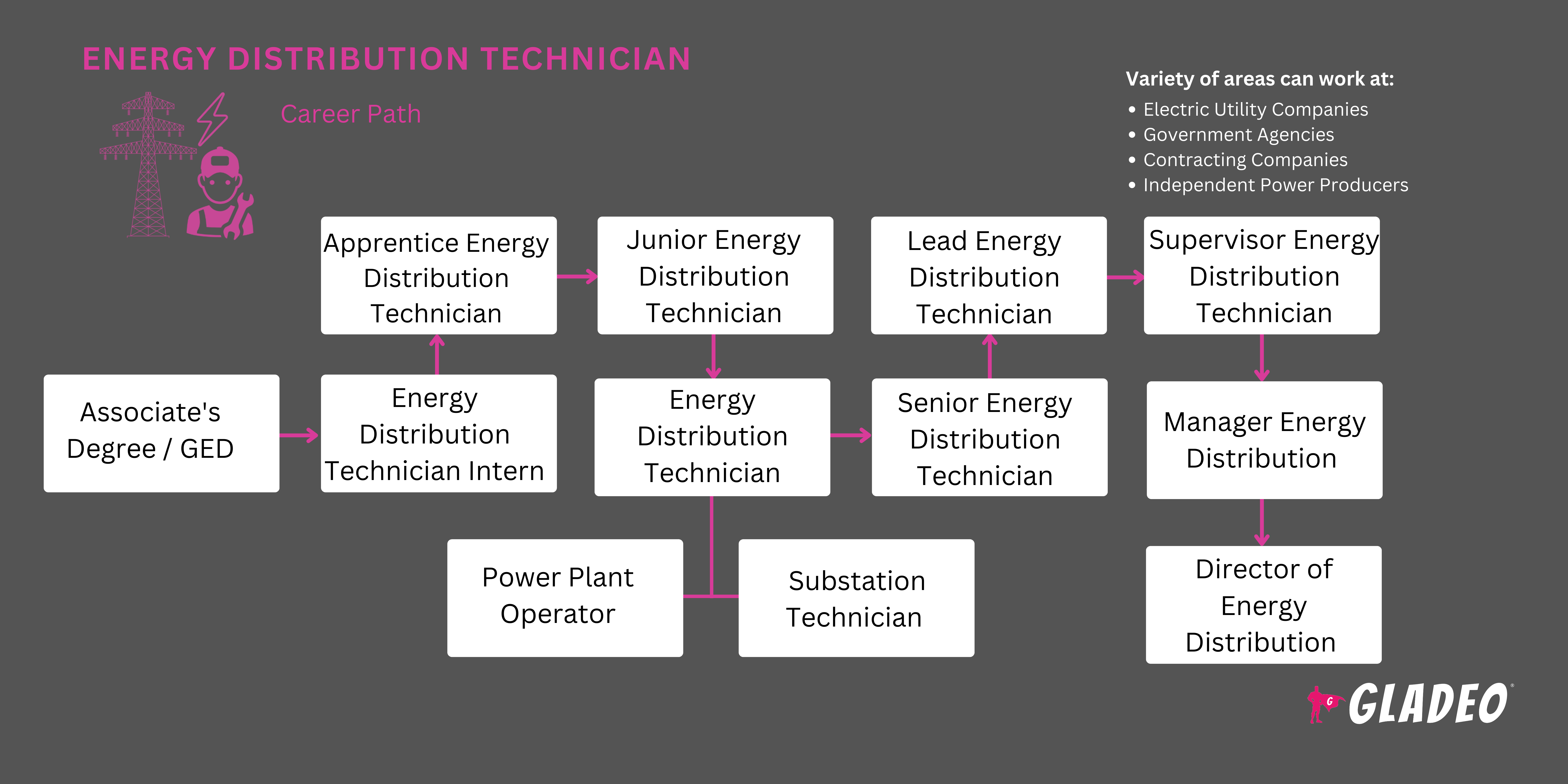
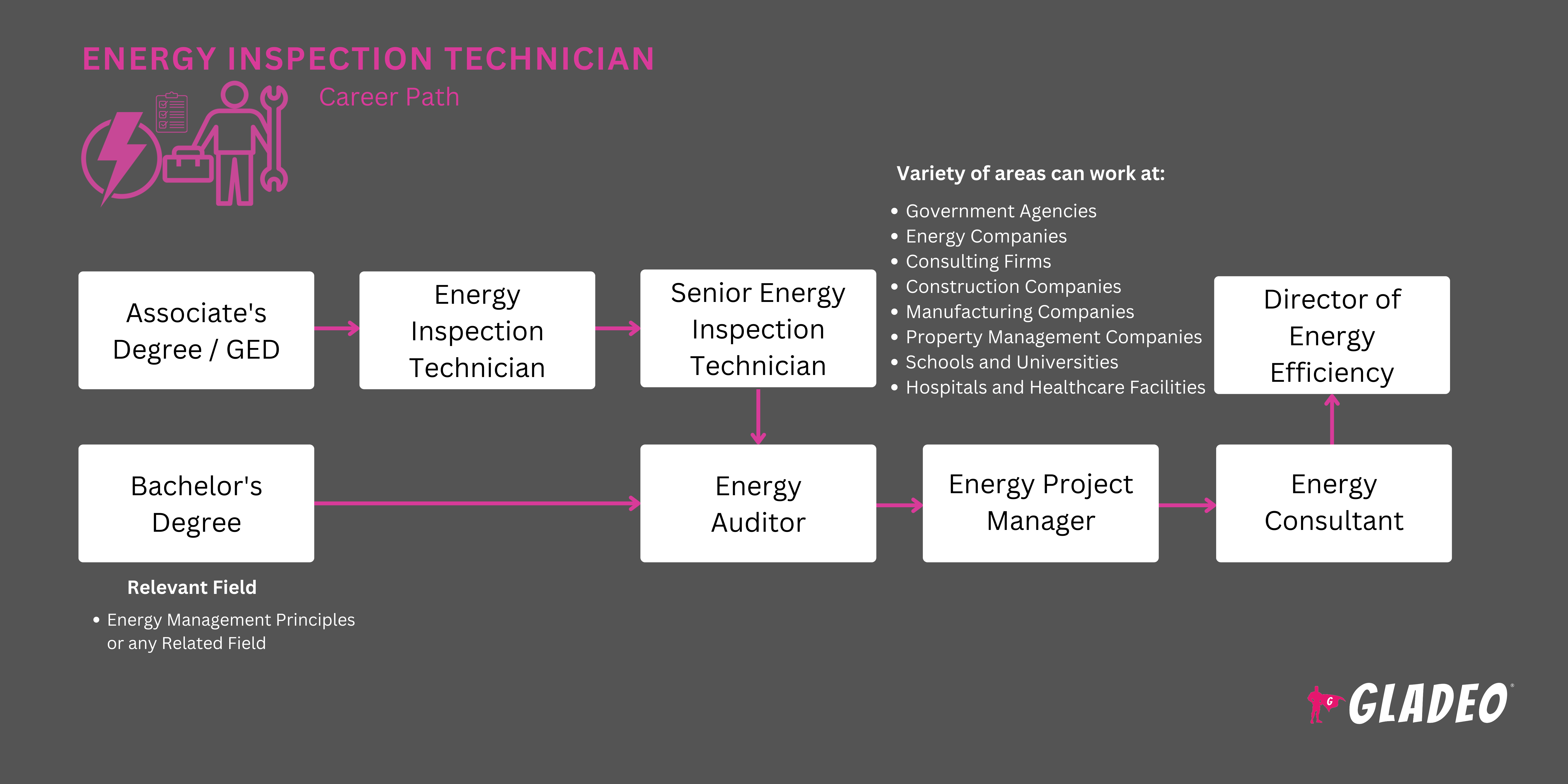
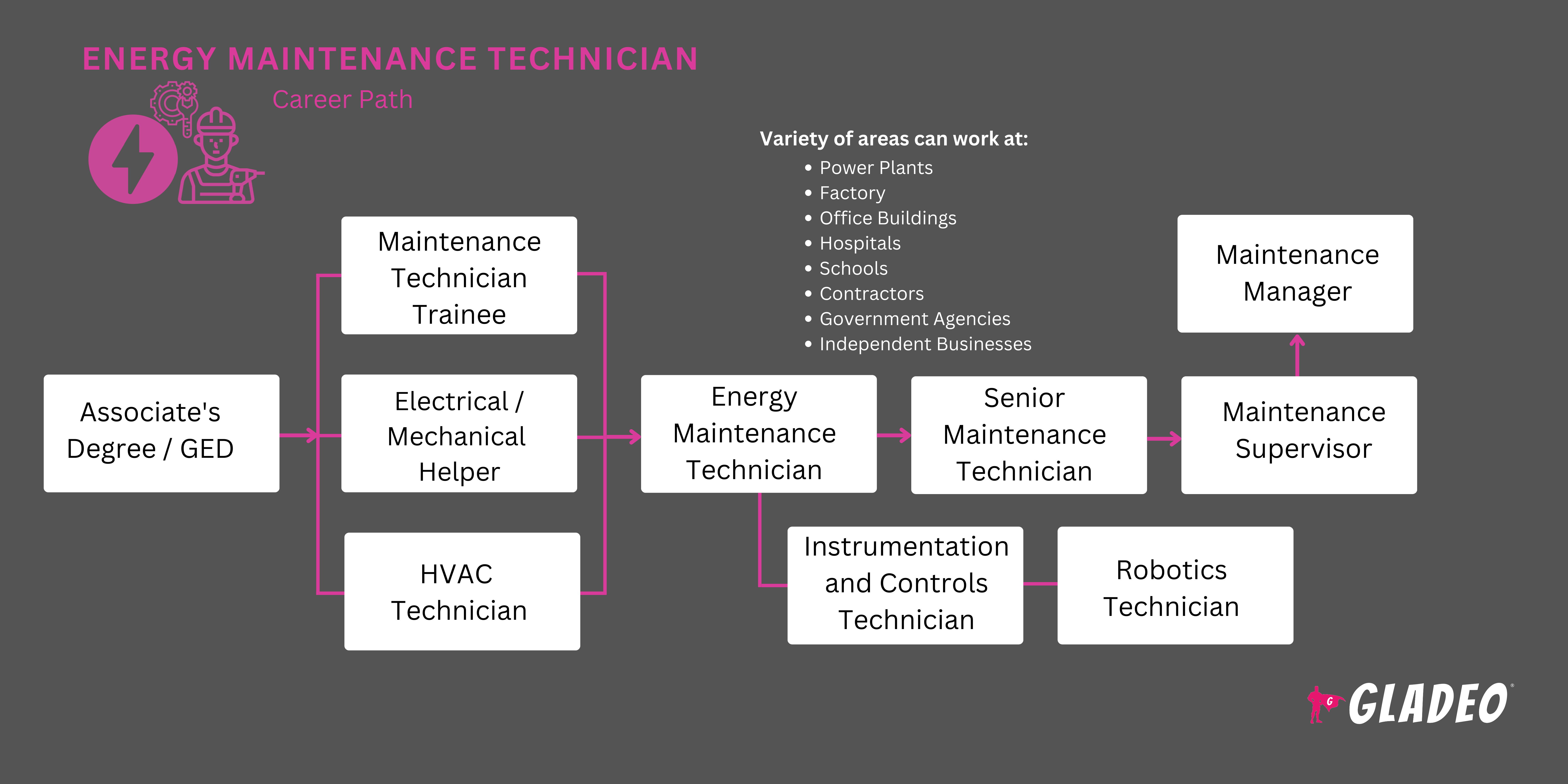
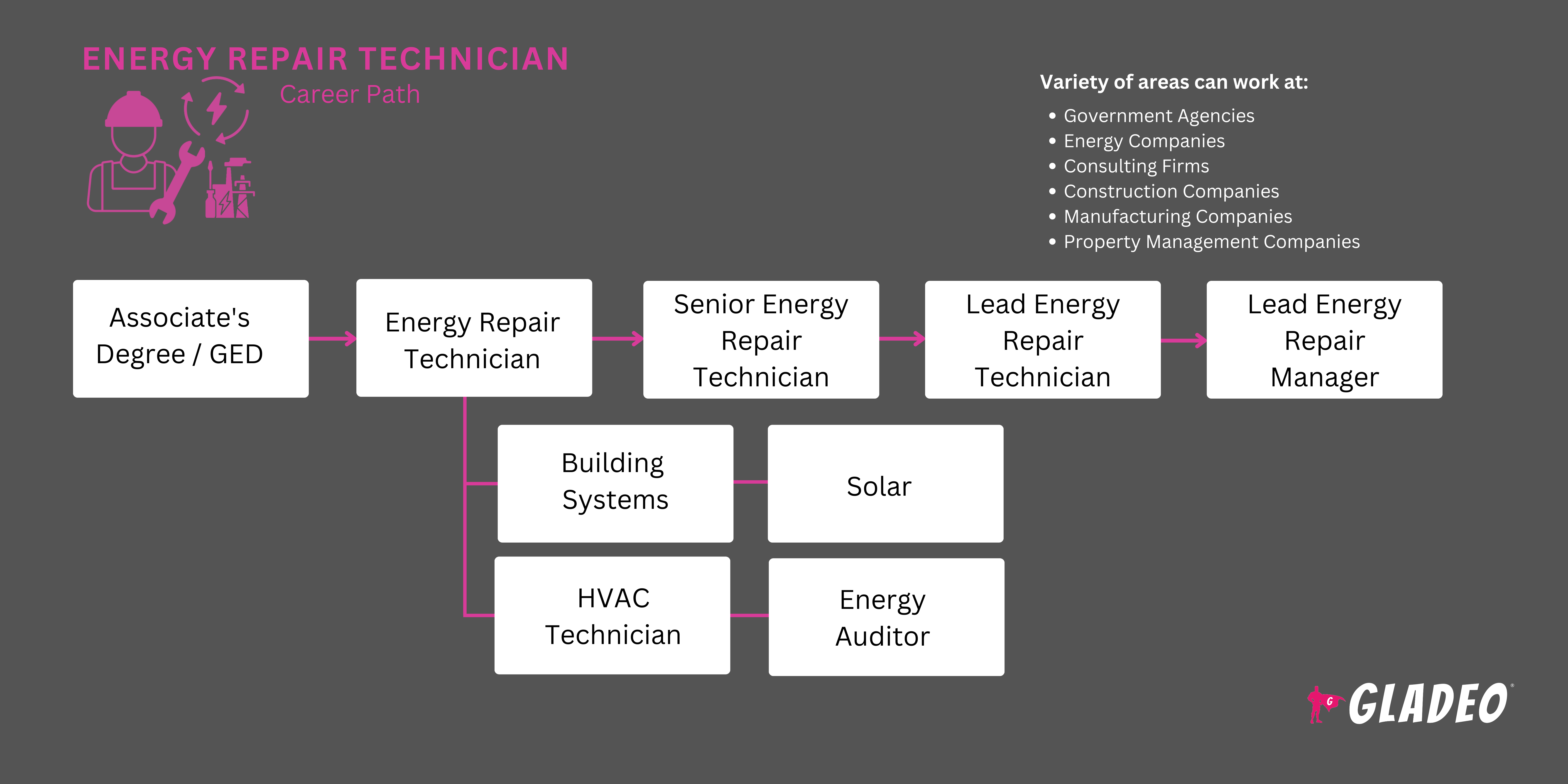
Trong khi tìm kiếm việc làm, hãy nhớ rằng có rất nhiều chức danh công việc có thể!
- Kiểm tra các bài đăng việc làm trên các nền tảng như Indeed và các bảng công việc dành riêng cho ngành như Mạng lưới việc làm năng lượng
- Đừng quên Craigslist địa phương của bạn hoặc thực hiện tìm kiếm trên Google cho các công ty năng lượng địa phương và xem các trang nghề nghiệp của họ
- Đọc kỹ quảng cáo việc làm để biết các yêu cầu và kinh nghiệm cụ thể mà nhà tuyển dụng đang tìm kiếm. Chỉ áp dụng cho các công việc bạn đủ điều kiện
- Lưu ý các từ khóa được sử dụng trong tin tuyển dụng. Cố gắng đưa chúng vào sơ yếu lý lịch của bạn, nếu chúng áp dụng
- Tìm kiếm trực tuyến các mẫu sơ yếu lý lịch phù hợp để lấy ý tưởng về định dạng, cụm từ và từ khóa
- Sử dụng trung tâm hướng nghiệp của trường bạn để được trợ giúp chuẩn bị sơ yếu lý lịch và phỏng vấn. Nghiên cứu thuật ngữ và xu hướng liên quan đến ngành
- Hỏi trường học của bạn nếu họ có quan hệ với các nhà tuyển dụng hoặc nhà tuyển dụng địa phương
- Đăng ký thực tập, Chương trình học nghề đã đăng ký hoặc các vị trí đầu vào để có được kinh nghiệm liên quan và đặt chân vào cánh cửa
- Nếu bạn thực tập hoặc học nghề, hãy nói chuyện với người giám sát / cố vấn của bạn về tiềm năng cho một công việc toàn thời gian
- Hãy để mọi người trong mạng lưới của bạn biết bạn đang tìm kiếm cơ hội việc làm
- Hỏi các cựu giám sát viên và giáo sư đại học nếu họ sẽ phục vụ như một tài liệu tham khảo hoặc viết cho bạn một lá thư giới thiệu
- Ăn mặc phù hợp cho các cuộc phỏng vấn xin việc
- Thảo luận về các lựa chọn phát triển nghề nghiệp với người giám sát của bạn và lắng nghe lời khuyên của họ
- Tìm kiếm sự cố vấn từ các chuyên gia giàu kinh nghiệm hơn
- Hiểu mục tiêu kinh doanh của chủ lao động và vai trò của bạn đóng góp như thế nào
- Chủ động loại bỏ một số khóa học giáo dục thường xuyên, chứng chỉ chuyên ngành hoặc bằng cấp cao hơn. Chứng chỉ phát triển chuyên môn bao gồm:
Người lắp đặt và sửa chữa đường dây điện
Chứng nhận:
Giáo dục thường xuyên:
- Chương trình đào tạo lineman nâng cao
- Đào tạo an toàn điện và điện áp cao
- Các khóa học ứng phó khẩn cấp và khắc phục thảm họa
Nhà phân phối và điều phối điện
Chứng nhận:
- Chứng nhận người vận hành hệ thống (dành cho người điều phối tải)
- Chứng nhận kiểm tra năng lượng điện
- Giám đốc năng lượng được chứng nhận
Giáo dục thường xuyên:
- Các khóa học quản lý và vận hành lưới điện
- Đào tạo thị trường năng lượng và quy định
- Quản lý khẩn cấp và đào tạo độ tin cậy của hệ thống
Sửa chữa điện và điện tử, Powerhouse, trạm biến áp và rơle
Chứng nhận:
Giáo dục thường xuyên:
- Hệ thống điện và các khóa học điều khiển rơle
- Đào tạo vận hành và bảo trì trạm biến áp
- Kỹ thuật sửa chữa máy móc điện
Động cơ điện, dụng cụ điện và các thợ sửa chữa liên quan
Chứng nhận:
- Chứng nhận Hiệp hội Dịch vụ Thiết bị Điện
- Chứng nhận sửa chữa động cơ
- Chứng nhận sửa chữa dụng cụ điện
Giáo dục thường xuyên:
- Khóa học sửa chữa động cơ điện và máy phát điện
- Kỹ thuật bảo trì và xử lý sự cố công nghiệp
- Các khóa học sửa chữa và công nghệ pin
- Tình nguyện cho các dự án đầy thách thức để chứng minh khả năng thích ứng và tiềm năng lãnh đạo của bạn
- Luôn cập nhật những tiến bộ trong công nghệ liên quan đến năng lượng
- Tham gia vào các tổ chức chuyên nghiệp để phát triển mạng lưới của bạn và học hỏi những điều mới
- Cố vấn cho nhân viên cơ sở hoặc thực tập sinh. Chia sẻ chuyên môn của bạn, thiết lập kỳ vọng và đặt tiêu chuẩn cao
- Luôn thực hành các quy trình an toàn tốt khi xử lý dụng cụ cầm tay và thiết bị được cấp nguồn, hoặc khi làm việc trong điều kiện nguy hiểm tiềm tàng
Trang web
- Hội đồng Hoa Kỳ về một nền kinh tế tiết kiệm năng lượng
- Liên minh đào tạo điện
- Viện nghiên cứu điện lực
- Energy.gov
- Chuyên gia năng lượng học việc
- NGÔI SAO NĂNG LƯỢNG
- ETA quốc tế
- Nhà thầu điện độc lập
- Viện Kỹ sư Điện và Điện tử
- Tình anh em quốc tế của công nhân điện
- Hiệp hội thử nghiệm điện liên quốc gia
- Hội đồng năng lượng tái tạo giữa các tiểu bang
- Hiệp hội nhà thầu điện quốc gia
- Viện chứng nhận quốc gia về công nghệ kỹ thuật
- Phòng thí nghiệm năng lượng tái tạo quốc gia
- Hội đồng các nhà hành nghề năng lượng được chứng nhận ở Bắc Mỹ
- Cơ quan Quản lý An toàn và Sức khỏe Nghề nghiệp
- Hiệp hội các ngành công nghiệp năng lượng mặt trời
- Năng Lượng Mặt Trời Quốc Tế
- Cơ quan Thông tin Năng lượng Hoa Kỳ
Sách vở
- Sản xuất, truyền tải và phân phối điện, bởi Leonard L. Grigsby
- Tua bin khí để phát điện, bởi S. Cần Gülen
- Phát điện tại chỗ: Hướng dẫn toàn diện về phát điện tại chỗ, bởi Hiệp hội Hệ thống Phát điện
- Power Generation Technologies, bởi Paul Breeze
Có một loạt các chức danh công việc có thể thuộc thuật ngữ chung của Kỹ thuật viên Hệ thống điện. Chức danh công việc bao gồm:
- Sửa chữa pin
- Trình cài đặt-sửa chữa cáp
- Trình cài đặt / bảo trì hệ thống cáp
- Fitter kiểm soát ăn mòn
- Máy lắp ráp & kiểm tra động cơ điện
- Sửa chữa điện và điện tử (Powerhouse, trạm biến áp và rơle)
- Kỹ thuật viên kiểm tra điện trường
- Người lắp đặt và sửa chữa đường dây điện
- Thợ điện, Powerhouse
- Thợ điện, trạm biến áp
- Động cơ điện, thợ sửa chữa dụng cụ điện
- Thợ điện cao thế
- Line Erector (Power-Line Distribution Erector)
- Bộ điều phối tải
- Nhà phân phối và điều phối điện
- Lắp dựng phân phối đường dây điện
- Sửa chữa máy biến áp điện
- Kỹ thuật viên rơle
- Nhà điều hành trạm biến áp
- Tổng đài viên (Tiện ích)
- Sửa chữa máy biến áp
- Công nhân đường dây truyền tải
Ngoài những điều trên, một số lĩnh vực nghề nghiệp khác có thể được quan tâm, chẳng hạn như:
- Kỹ thuật viên tự động hóa tòa nhà
- Thợ mộc
- Công nhân xây dựng
- Kỹ sư hệ thống điều khiển
- Kỹ sư điện
- Thiết bị kiểm tra thiết bị điện
- Quản lý dự án điện
- Thanh tra an toàn điện
- Nhà thiết kế hệ thống điện
- Thợ điện
- Kỹ thuật viên điện tử
- Tư vấn hiệu quả năng lượng
- Glazier
- Kỹ thuật viên chất thải nguy hại
- Cơ khí sưởi ấm, điều hòa không khí và điện lạnh
- Kiểm toán viên năng lượng tại nhà
- Thợ điện công nghiệp
- Kỹ thuật viên thiết bị đo đạc
- Thợ sắt
- Công nhân xây
- Chuyên gia An toàn và Sức khỏe Nghề nghiệp
- Thợ sửa ống nước, Pipefitter, Steamfitter
- Kỹ thuật viên năng lượng tái tạo
- Thợ lợp mái
- Kỹ sư lưới điện thông minh
- Trình cài đặt bảng điều khiển năng lượng mặt trời
- Chuyên gia tài nguyên nước
- Kỹ thuật viên tuabin gió
Nguồn cấp tin tức

Việc làm nổi bật

Các khóa học và công cụ trực tuyến





